- Home
- Gayle Forman
Just One Day jod-1 Page 10
Just One Day jod-1 Read online
Page 10
We just stand there, facing off. A waiter appears. I expect him to ream us out for letting in the chilly air, or for looking like dirty, bloodied riffraff. But he ushers me inside like he’s the host to a party, and I’m the guest of honor. He sees my neck, and his eyes go wide. Willem says something in French, and he nods at once, gesturing to a corner table.
The restaurant is warm, the air tangy with onions and sweet with vanilla, and I am too defeated to resist. I slump down into a chair, covering my cut with one hand. My other hand relaxes and releases my watch onto the white cloth, where it ticks malevolently.
The waiter returns with a small, white first-aid box and a blackboard menu. Willem opens the kit and pulls out a medicated wipe, but I snatch it from him.
“I can do it myself!” I say.
I dab the wound with ointment and cover it with an oversize bandage. The waiter returns to check my work. He nods approvingly. Then he says something to me in French. “He’s asking if you want to hang your sweater in the kitchen so it can dry,” Willem says.
I have to fight the urge to bury my face into his long, crisp, white apron and weep with gratitude for his kindness. Instead, I hand over my soaked sweater. Underneath, my damp T-shirt clings to me; there are bloodstains on the collar. I have the T-shirt Céline gave me, the same obscure, too-cool-for-school band T-shirt Willem is wearing, but I’d rather parade around in my bra than put that on. Willem says something else in French, and moments later, a large carafe of red wine is delivered to our table.
“I thought I had a train to catch.”
“You have time to eat a little something.” Willem pours a glass of wine and hands it to me.
I am technically of age to drink all over Europe, but I haven’t, not even when, at some of the prepaid lunches, wine was offered as a matter of course and some of the kids sneaked glasses when Ms. Foley wasn’t looking. Tonight, I don’t hesitate. The wine glints shades of blood in the candlelight, and drinking it is like receiving a transfusion. The warmth goes from my throat to my stomach before setting to work on the chill that has settled in my bones. I drain half a glass in one go.
“Easy there,” Willem cautions.
I gulp the rest of it and thrust out my glass like a middle finger. Willem appraises me for a second, then fills the glass to the rim.
The waiter returns and makes a formal show of handing us a chalkboard menu and a basket of bread with a small silver ramekin.
“Et pour vous, le pâté.”
“Thank you,” I say. “I mean, merci.”
He smiles. “De rien.”
Willem breaks off a piece of bread and spreads it with the brown paste and offers it to me. I just glare at him.
“Better than Nutella,” he teases in an almost singsong voice.
Maybe it is the wine or the prospect of getting rid of me, but Willem, the Willem I’ve been with all day, is back. And somehow, this makes me furious. “I’m not hungry,” I say, even though I am, in fact, famished. I haven’t eaten anything since that crêpe. “And it looks like dog food,” I add for good measure.
“Just try.” He holds the bread and pâté up to my mouth. I snatch it from his hands, take a tiny sample. The flavor is both delicate and intense, like meat butter. But I refuse to give him the satisfaction of seeing me enjoy it. I nibble a bite and make a face. Then I put the bread back down again.
The waiter returns, sees our emptying wine carafe, gestures to it. Willem nods. He returns with a full one. “The sole is . . . it is finis,” he says in English, wiping the entry off the chalkboard. He looks at me. “You are cold and have lost blood,” he says, as if I hemorrhaged or something. “I recommend something with force.” He makes a fist. “The beef bourguignon is excellent. We also have a fish pot au feu, very good.”
“Just keep it coming,” I say, gesturing to the wine.
The waiter frowns slightly and looks to me, then Willem, like I am somehow their joint responsibility. “May I suggest to start, a salad with some asparagus and smoked salmon.”
My traitorous stomach gurgles. Willem nods, then orders for both of us, the two things that the waiter recommended. He doesn’t even bother to ask me what I want. Which is fine, because right now all I want is wine. I reach out for another glass, but Willem puts his hand on top of the opening of the carafe. “You have to eat something first,” he says. “It’s from duck, not pig.”
“So?” I shove a whole piece of baguette and pâté into my mouth, defiantly and noisily chomping on it, hiding any satisfaction I’m actually taking from it. Then I hold out my glass.
Willem looks at me for a long moment. But he does oblige with a refill and then that lazy half smile. In one day, I’ve come to love that smile. And now I want to murder it.
We sit in silence until the waiter returns to deliver the salad with a flourish befitting the beautiful dish: a still life of pink salmon, green asparagus, yellow mustard sauce, and toast points scattered around the side of the plate like blossoms. My mouth waters, and it’s like my body is waving the white flag, telling me to just give in, to quit while I’m ahead, to accept the nice day I had, which really, is far more than I had any right to hope for. But there’s another part of me that is still hungry, hungry not just for food, but for everything that’s been laid out in front of me today. On behalf of that hungry girl, I refuse the salad.
“You’re still upset,” he says. “It’s not so bad as I thought. It won’t even scar.”
Yes, it will. Even if it heals up next week, it’ll scar, although maybe not in the way he means. “You think I’m upset about this?” I touch the bandage on my neck.
He won’t look at me. He knows damn well I’m not upset about that. “Let’s just eat something, okay?”
“You’re sending me back. Do what you have to do, but don’t ask me to be happy about it.”
Over the dancing candlelight, I see his expressions pass by like fast clouds: surprise, amusement, frustration, and tenderness—or maybe it’s pity. “You were going to leave tomorrow, so what’s the difference?” He brushes some bread crumbs off the tablecloth.
The difference, Willem? The difference is the night.
“Whatever,” is my stellar reply.
“Whatever?” Willem asks. He runs his finger along the rim of his glass; it makes a low sound, like a foghorn. “Did you think about what would happen?”
It’s all I’ve been thinking about, and all I’ve been trying not to think about: What would happen tonight.
But again, I’ve misunderstood him. “Did you think about what would happen if they caught us?” he continues.
I could feel what they wanted to do to him. I could taste their violence in my own mouth. “That’s why I threw the book at them; they wanted to hurt you,” I say. “What did you say to them to get them so angry?”
“They were already angry,” he says, evading my question. “I just gave them a different reason.” But by his answer and the look on his face, I can tell that I’m not wrong. That they were going to hurt him. What I felt about that, at least, was real.
“Can you imagine if they’d caught us? You?” Willem voice is so quiet I have to lean in to hear him. “Look what they did.” He reaches over as if to touch my neck, but then pulls back.
In the adrenaline of the chase and the weird euphoria that followed, I hadn’t thought about them catching me. Maybe because it hadn’t seemed possible. We had wings on our feet; they had leaden boots. But now, here, with Willem sitting across from me, wearing this strange, somber expression, with his bloody bandanna crumpled into a ball on the side of the table, I can hear those boots getting closer, can hear them stomping, can hear bones cracking.
“But they didn’t catch us.” I swallow the tremble in my voice with another gulp of wine.
He finishes his wine and stares at the empty glass for a moment. “This is not what I brought you here for.”
“What did you bring me here for?” Because he never answered that. Never said why he asked me to come to Pa
ris with him for the day.
He rubs his eyes with the heel of his hands. When he removes his hands, he looks different somehow. Stripped bare of all the masks. “Not for things to get out of control.”
“Well, a little late for that.” I’m trying to be flip, to summon whatever dregs of Lulu I have left. But when I say it, the truth of it wallops me in the stomach. We, or at least, I, have long since passed the point of no return.
I look back at him. His eyes lock on mine. The current clicks back on.
“I suppose it is,” Willem says.
Twelve
Maybe Jacques was right, and time really is fluid. Because as we eat, my watch sits there on the table and seems to bend and distort like a Salvador Dalí painting. And then at one point, somewhere between the beef bourguignon and crème brûlée, Willem reaches for it and looks at me for a long moment before slipping it back on his wrist. I feel this profound sense of relief. Not just that I’m not being sent back to London tonight, but that he is taking charge of time again. My surrender is now complete.
It is late when we spill out onto the streets, and Paris has turned into a sepia-toned photograph. It’s too late to get a hotel or youth hostel, and there’s no money left, anyhow. I gave the rest of my cash, my forty pounds, to Willem to help pay for dinner. The waiter protested when we paid, not because we gave him a grab-bag of euros and pounds, but because we gave him the equivalent of a twenty-five-dollar tip. “Too much,” he protested.” Wholly insufficient, I thought.
But now here I am: No money. No place to stay. It should be my worst nightmare. But I don’t care. It’s funny the things you think you’re scared of until they’re upon you, and then you’re not.
And so we walk. The streets are quiet. It seems to be just us and street sweepers in their bright-green jumpsuits, their twig-like neon-green brooms looking like they were plucked from a magical forest. There’s the flash of headlights as cars and taxis pass by, splashing through the puddles left by the earlier downpour, which has now softened to a misty drizzle.
We walk along the quiet canals and then along the park with the lake where we hitched a ride earlier in the day. We walk under the elevated railroad tracks.
Eventually, we wind up in a small Chinatown. It’s closed up for the night, but the signs are all lit up.
“Look,” I say to Willem, pointing to one. “It’s double happiness.”
Willem stops and looks at the sign. His face is beautiful, even reflected in the bright neon glow.
“Double happiness.” He smiles. Then he takes my hand.
My heart somersaults. “Where are we going?”
“You never got to see any art.”
“It’s one in the morning.”
“It’s Paris!”
We wend deeper into Chinatown, cutting up and down the streets until Willem finds what he’s looking for: a series of tall, dilapidated buildings with barred windows. They all look the same except for the building on the far right; it is covered in red scaffolding from which hangs a series of very modern, very distorted portraits. The front door is completely covered in colorful graffiti and flyers.
“What is this place?”
“An art squat.”
“What’s that?”
Willem tells me about squats, abandoned buildings that artists or musicians or punks or activists take over. “Usually, they’ll put you up for the night. I haven’t slept here, but I’ve been inside once, and they were pretty nice.”
But when Willem tries the heavy steel front door, it’s locked and chained from the outside. He steps back to look at the windows, but the whole place, like the surrounding neighborhood, is tucked in for the night.
Willem looks at me apologetically. “I thought someone would be here tonight.” He sighs. “We can stay with Céline.” But even he looks less than thrilled at that prospect.
I shake my head. I would rather walk all night in the pouring rain. And, anyway, the rain has stopped. A thin sliver of moon is dodging in and out of the clouds. It looks so fundamentally Parisian hanging over the slanting rooftops that it’s hard to believe this is the same moon that will shine in my bedroom window back home tonight. Willem follows my gaze up to the sky. Then his eyes lock on something.
He walks back toward the building, and I follow him. Along one corner, a piece of scaffolding runs up to a ledge that leads to an open window. A curtain billows in the breeze.
Willem looks at the window. Then at me. “Can you climb?”
Yesterday I would’ve said no. Too high. Too dangerous. But today I say, “I can try.”
I sling my bag over my shoulder and step onto the ladder Willem has made with the loop of his hands. He heaves me halfway up, and I get a foothold in a groove in the plaster and use the scaffolding to get myself to the ledge. I sort of belly-slide across it and grab at the spiral railings by the window, heaving myself through headfirst.
“I’m okay!” I call. “I’m fine.”
I poke my head out the window. Willem is standing just below. He has that private little half smile again. And then as effortlessly as a squirrel, he shimmies up, steps upright onto the ledge, crosses it with his arms out like a tightrope walker, bends his knees, and slips into the window.
It takes a minute for my eyes to adjust to the darkness, but once they do, I see white everywhere: white walls, white shelves, white desk, white clay sculptures.
“Someone left us a key,” Willem says.
We are both quiet. I like to think it’s a moment of thanksgiving for the providence of accidents.
Willem pulls out a small flashlight. “Shall we explore?”
I nod. We set off, examining a sculpture that looks like it’s made of marshmallows, a series of black-and-white photos of naked fat girls, a series of oil paintings of naked skinny girls. He shines the flashlight around a giant sculpture, very futuristic, metal and tubes, all twisted and turning, like an artist’s rendition of a space station.
We pad down the creaking stairs to a room with black walls and enormous photographs of people floating in deep blue water. I stand there and can almost feel the soft water, the way the waves caress when I sometimes go swimming in Mexico at night to escape the crowds.
“What do you think?” Willem asks.
“Better than the Louvre.”
We go back upstairs. Willem clicks off the flashlight.
“You know? One day one of these might be in the Louvre,” he says. He touches an elliptical white sculpture that seems to glow in the darkness. “You think Shakespeare ever guessed Guerrilla Will would be doing his plays four hundred years later?” He laughs a little, but there’s something in his voice that sounds almost reverent. “You never know what will last.”
He said that earlier, about accidents, about never knowing which one is just a kink in the road and which one is a fork, about never knowing your life is changing until it’s already happened.
“I think sometimes you do know,” I say, my voice filling with emotion.
Willem turns to me, fingers the strap on my shoulder bag. For a second, I can’t move. I can’t breathe. He lifts my bag and drops it to the floor. An eddy of dust flies up and tickles my nose. I sneeze.
“Gezondheid,” Willem says.
“Hagelslag,” I say back.
“You remember that?”
“I remember everything from today.” There’s a lump in my throat as I understand just how true this is.
“What will you remember?” He drops his backpack next to my messenger bag. They slump into each other like old war buddies.
I lean back against the worktable. The day flashes before me: From Willem’s playful voice over my breakfast on the first train to the exhilaration of making my strange admission to him on the next train to the Giant’s amiable kiss in the club to the cooling stickiness of Willem’s saliva on my wrist at the café to the sound of secrets underneath Paris to the release I experienced when my watch came off to the electricity I felt when Willem’s hand found me to the shatt
ering fear of that girl’s scream to Willem’s brave and immediate reaction to it to our flight through Paris, which felt just like that, like flight, to his eyes: the way they watch me, tease me, test me, and, yet, somehow understand me.
That’s what I see before my eyes when I think of this day.
It has to do with Paris, but more than that, it has to do with the person who brought me here. And with the person he allowed me to become here. I’m too overcome to explain it all, so instead I say the one word that encapsulates it: “You.”
“And what about this?” He touches the bandage on my neck. I feel a jolt that has nothing to do with the wound.
“I don’t care about that,” I whisper.
“I care,” he whispers back.
What Willem doesn’t know—what he can’t know, because he didn’t know me before today—is that none of that matters. “I wasn’t in danger today,” I tell him in a choked voice. “I escaped danger today.” And I did. Not just getting away from the skinheads, but I feel like the whole day has been an electrical shock, paddles straight to my heart, bringing me out of a lifelong torpor I hadn’t even known I was in. “I escaped,” I repeat.
“You escaped.” He comes closer so he towers over me. My back is pressed into the worktable, and my heart starts to pound because there’s no escaping this. I don’t want to escape this.
As if disconnected from the rest of my body, my hand raises in the air and goes to touch his cheek. But before it arrives, Willem’s hand whips around and grabs my wrist. For one confused second, I think I’ve misread the situation again, am about to be refused.
Willem holds my wrist for a long moment, looking at that birthmark. Then he lifts it to his mouth. And though his lips are soft and his kiss is gentle, it feels like a knife jamming into the electrical socket. It feels like the moment when I go live.
Willem kisses my wrist, then moves upward, along the inside of my arm to the tickly crook of my elbow, to my armpit, to places that never seemed deserving of kisses. My breath grows ragged as his lips graze my shoulder blade now, stopping to drink at the pool of my clavicle before turning their attention to the cords of my neck, to the area around the bandage, then gently to the top of the bandage. Parts of my body I never even realized existed come alive as the circuits click on.

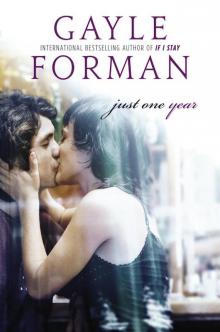 Just One Year
Just One Year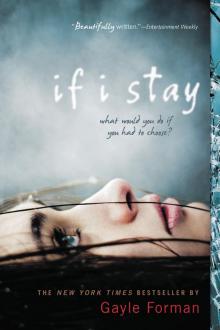 If I Stay
If I Stay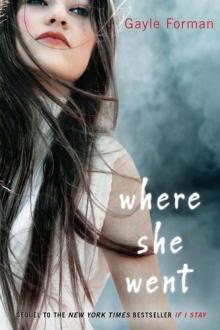 Where She Went
Where She Went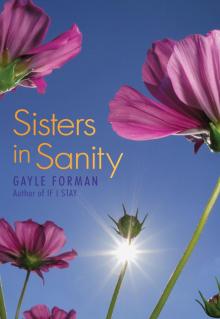 Sisters in Sanity
Sisters in Sanity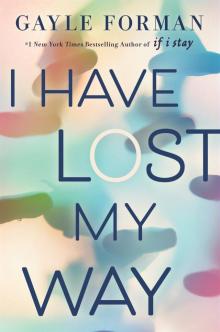 I Have Lost My Way
I Have Lost My Way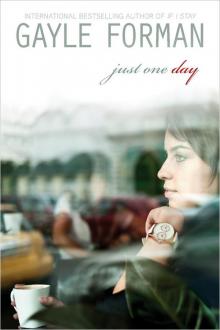 Just One Day
Just One Day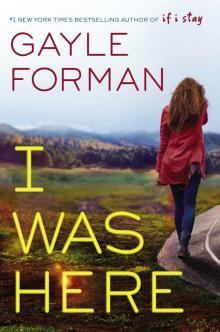 I Was Here
I Was Here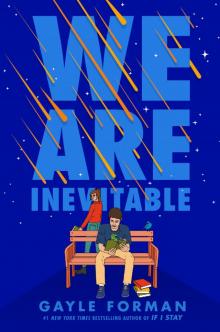 We Are Inevitable
We Are Inevitable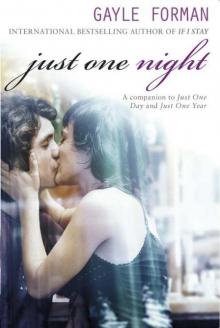 Just One Night
Just One Night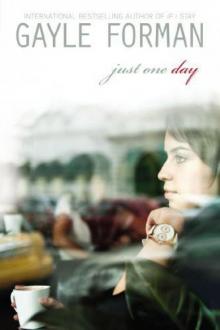 Just One Day jod-1
Just One Day jod-1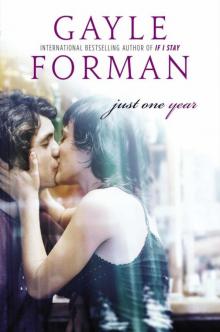 Just One Day 02: Just One Year
Just One Day 02: Just One Year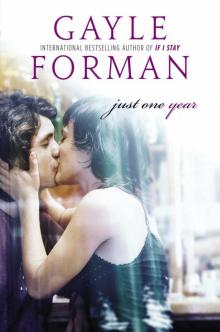 Just One Year jod-2
Just One Year jod-2